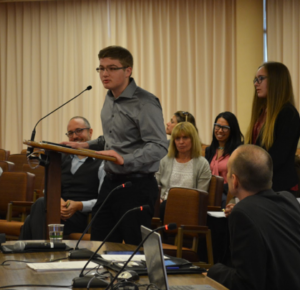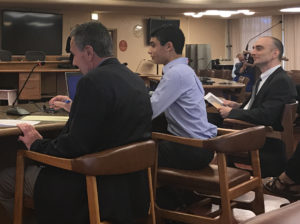
Last month, yli celebrated its 103rd policy win!
The Marin County Board of Supervisors unanimously voted to enhance the Social Host Ordinance (SHO), which holds adults responsible for underage alcohol and drug use in their households whether or not the adults are present. The amendment included adding marijuana to the language, expanding locations to include party buses and limousines, and moving from a punitive approach to a restorative justice approach for youth who violate the SHO.
“In Marin County, 40% of 11th graders currently (in the past 30 days) consume alcohol, 24% are binge drinking and 30% use marijuana,” noted Assistant County Counsel Jack Govi’s report to the board. “This is significantly higher than California averages.” The story was published in the Marin Independent Journal.
The Alcohol, Tobacco, and other Drugs (ATOD) prevention committee of the Marin County Youth Commission have worked on this effort for the last 3 years in partnership with several county wide coalitions including Communities Mobilizing for Change on Alcohol (CMCA) and the Marin Prevention Network (MPN). In the fall of 2016, a group of young people were caught on a party bus with marijuana, alcohol, and prescription drugs in their possession and community members quickly called for a town hall to address the prevalent drug use among youth. This was the catalyzing moment for the youth commission to identify policy solutions to address this issue. Youth spent countless hours meeting amongst themselves, with community partners, elected officials, and law enforcement to present and discuss their ideas on how to improve this policy.

The primary goal for the youth commission was to ensure youth who violated the SHO were provided the opportunity to engage in a restorative process rather than pay a fine. Restorative justice is an evidence-based program that encourages peer-to-peer engagement and allows youth to reflect on the impacts of drugs and alcohol on youth and their communities. “I think the restorative justice programs are the lynchpin of this whole program,” said Supervisor Damon Connolly. “The peer-to-peer interaction is important.”
The youth commission, in partnership with CMCA and MPN, led a presentation to the Marin County Board of Supervisors to urge them to vote in favor of the newly updated policy and to stress the power of restorative justice. Josh Rowe, an incoming sophomore at San Domenico High School, said the restorative justice programs offer “a safe space for people to discuss what they did wrong” and to gain more awareness.
From identifying key issues, to research and relationship building, to developing and presenting policy recommendations to elected officials, this policy win is a shining example of the power of youth leadership to create real change in our communities.
This work was made possible by the generous support of Marin County Behavioral Health Services and the Marin County Board of Supervisors.
